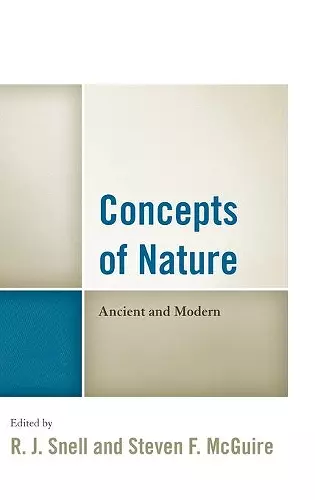Concepts of Nature
Ancient and Modern
R J Snell editor Steven F McGuire editor
Format:Hardback
Publisher:Lexington Books
Published:7th Oct '16
Currently unavailable, and unfortunately no date known when it will be back
This hardback is available in another edition too:
- Paperback£43.00(9781498527569)

If natural law arguments struggle to gain traction in contemporary moral and political discourse, could it be because we moderns do not share the understanding of nature on which that language was developed? Building on the work of important thinkers of the last half-century, including Leo Strauss, Eric Voegelin, John Finnis, and Bernard Lonergan, the essays in Concepts of Nature compare and contrast classical, medieval, and modern conceptions of nature in order to better understand how and why the concept of nature no longer seems to provide a limit or standard for human action. These essays also evaluate whether a rearticulation of pre-modern ideas (or perhaps a reconciliation or reconstitution on modern terms) is desirable and/or possible. Edited by R. J. Snell and Steven F. McGuire, this book will be of interest to intellectual historians, political theorists, theologians, and philosophers.
With this collection, philosopher R. J. Snell and political scientist Steven McGuire (both Eastern Univ.) investigate the differing conceptions of nature found in the Western philosophical tradition as a means of determining whether human nature can still serve as an effective standard for moral and political discourse. From its beginnings in classical philosophy to the Enlightenment, Western thought has been preoccupied with the idea of nature and its relation to human action. Though there is some reference to the medieval Christian contribution, most of the essays concentrate on the profound conflict between the ancients and the moderns on this issue. Because this was a central theme in the writings of Leo Strauss and Eric Voegelin, two masters of 20th-century political theory, it is not surprising that several essays reflect their influence. The collection also includes essays on some unfamiliar voices: there is a study of Louis Dupré’s treatment of modernity, an analysis of the idea of progress in H. G. Wells’s fiction, and an examination of secularism and the God question in the philosophy of Bernard Lonergan. This collection will provide more questions than answers, but the contributors should be applauded for asking the right questions. Summing Up: Recommended. Graduate students, researchers, faculty. * CHOICE *
[This book] is a fine example of Voegelin scholars engaging with a range of academic voices, and on a perennial topic of crucial philosophical and historical importance. * VoegelinView *
This diverse and compelling collection of essays is unfashionably oriented around the truth. Is the modern understanding of nature really true? Can the premodern—especially classical—views of nature be shown to have been displaced for inadequate reasons and so can become relevant alernatives for us? Can we return, in truth, to the primary experience of the cosmos that, say, Eric Voegelin finds in classical thought? If Aristotle's thought remains plausible, can be we return to his understanding of nature? Or can we reappropriate his idea of practical reason while retaining the modern distinction between nature and human freedom? This excellent volume makes these questions real points of controversy for us today, displaying the kind of engagement that animates men and women convinced that the truth about nature really matters. -- Peter Augustine Lawler, Berry College
For modern human beings who are “lost in the cosmos,” the symbol “nature” is almost meaningless if not suspicious because it seems to undercut their sense of freedom and to place false and arbitrary limits on the scope of their technological pursuits. The contributors to this volume clarify what is at stake with the experience and symbol “nature” at a time when humanity’s place within it is at its greatest peril. Their efforts demonstrate its contemporary significance for ethical and political thinking. -- John von Heyking, University of Lethbridge
ISBN: 9781498527545
Dimensions: 239mm x 160mm x 24mm
Weight: 522g
250 pages